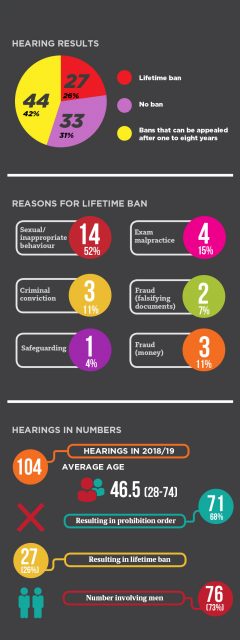The number of teachers banned from the profession for life without the right to appeal last year has almost halved, while those escaping misconduct hearings without any prohibition rose.
Our analysis has prompted further calls for reform to a system that one senior lawyer says leaves the Teacher Regulation Agency (TRA) without the “nuance” needed to deal with misconduct.
Of the 104 misconduct hearings carried out by the TRA in 2018-19, a quarter (27) resulted in a ban with no appeal.
That was way down on the 45 per cent (53) of teachers who received lifetime bans in 2017-18, and 36 per cent (49) the year before.
Almost a third (33) were not banned, up from 23 per cent (27) the year before and 20 per cent (27) in 2016-17.
Unlike professional regulators in other sectors, and education regulators in Scotland and Wales, the TRA can only ban or not ban – no other sanctions are available.

Sarah Linden, a senior solicitor at the Association of School and College Leaders, said a ban was not proportionate in all cases and “something short of a ban needs to be recognised”, such as a temporary suspension or re-training.
She said some teachers could be “potentially at large in the workforce without the full weight of a regulatory sanction” because their misconduct did not warrant a ban.
All banned teachers receive a lifetime prohibition, but some can appeal after a specified time. Last year, 68 per cent (71) of misconduct hearings resulted in a prohibition order.
The education secretary makes the final decision on whether to bar a teacher.
Andrew Faux, a barrister at The Reflective Practice, said every other professional regulator could make a “graded response” to misconduct. But because the TRA was “not a professional regulator, it’s just the education secretary making barring decisions, there’s no nuance in it.”
As panels could not suspend teachers for a short period or require re-training, they “end up prohibiting people who they probably wish they could keep in the profession and support”.
Of those banned for life without appeal, more than half related to sexual or inappropriate behaviour towards pupils. Fifteen per cent were banned for exam malpractice, and 11 per cent for criminal convictions.
Alan Stevens, a vice-principal in Cambridgeshire, was convicted for fraud after he claimed over £300 expenses for personal items from a company linked to the school. But the panel decided not to ban him because he was a “well regarded” teacher who expressed remorse.
Lewis Morrison drank up to seven bottles of beer at a school prom, telling male pupils that girls were “gagging for it”. He was videoed saying he would knock the headteacher “the f*** out”. The panel said it was “crass stupidity”, but a one-off where no one came to harm.
Rachel Clint avoided a ban after sitting on a pupil’s knee and kissing him following a leavers’ drinks event for year 13 pupils. The panel said the kiss was “spontaneous” and not sexual, highlighting Clint’s “unblemished record”.
Faux said teachers who are not banned were still found guilty of misconduct and had to declare it to prospective employers.







Your thoughts